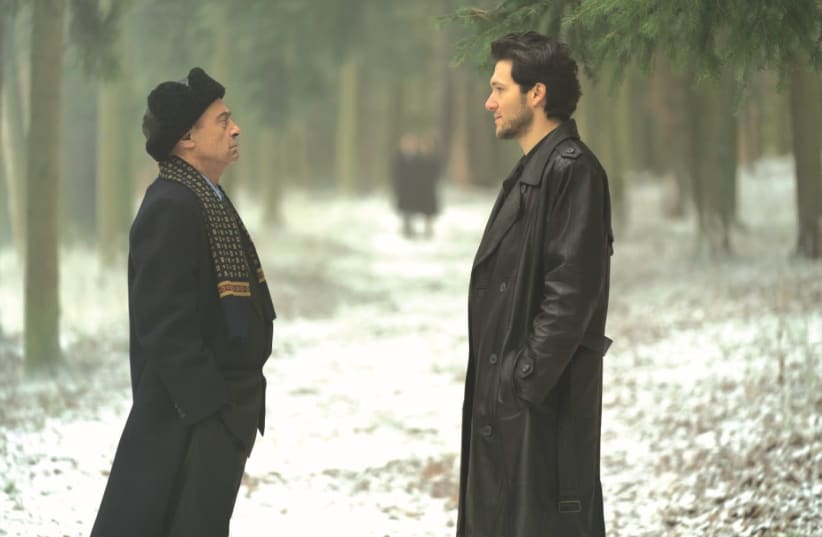The movie is being broadcast in Israel on Yes, Cellcom TV, HOT VOD and Next TV starting on May 30 and on HOT HBO on May 31 at 10 p.m.
This dramatization of a back-channel peace process that looked like a huge breakthrough when it resulted in an agreement signed in 1993 now seems more than a little bittersweet, especially in light of the events of recent weeks. Perhaps no peace agreement in history has come in for as much criticism in retrospect as the Oslo Accords, which many today feel either did not go far enough or went too far, depending on your political point of view. Few in Israel will ever forget the historic signing ceremony at the White House in which US president Bill Clinton stood by as prime minister Yitzhak Rabin shook hands with the PLO chairman Yasser Arafat, but it’s difficult to watch or consider this scene today without thinking about Rabin’s assassination by a Jewish extremist opposed to the peace process two years later, or the rise of Hamas and the spate of bus bombings in Israel following the signing of the accords. You have to will yourself to not to think about what you know about the aftermath to enjoy the movie.
But Oslo is not about what followed, although titles at the end allude to these events. It focuses on a Norwegian couple, Mona Juul, a diplomat, and her sociologist husband, Terje Rød-Larsen, who found a way to get officials from Israel and the PLO to sit down together for the first time. The fact that these characters are played by two of the liveliest, sexiest actors from television’s new golden age is one of the pleasures of the series. Ruth Wilson, who played the lead in The Affair, is Mona, and Andrew Scott, known and loved by Fleabag fans for his portrayal of the priest character on that series (aka Hot Priest) is Terje. The Norwegian characters they portray are incredibly straitlaced, and part of the fun is watching how their contact with the Middle Eastern politicians and officials changes them and makes them take risks and even – on one memorable occasion – tell a lie, something that very much goes against the grain of the occasionally bullheaded honesty and uprightness that inspired them to jump-start the peace process in the first place.
The story really gets going once they manage to bring Israeli and Palestinian negotiators to an isolated mansion, Borregaard Manor, in a beautiful setting, staffed by a cook who makes meals that are so wonderful that the participants cannot help but bond over their shared love of her waffles, berries and cream. The first participants are the initially hostile Hassan Asfour (Waleed Zuaiter) and the more pragmatic Ahmed Qurie (Salim Dau – one of Israel’s finest actors, whose career includes such roles as the Egyptian soldier lost in the desert in Avanti Popolo as well as such recent television dramas as Fauda and Tyrant), for the Palestinians, and the slightly befuddled academics Ron Pundak (Rotem Keinan) and Yair Hirschfeld (Doval’e Glickman, best known as the father on Shtisel). Eventually, the Israeli team is joined by Uri Savir (Jeff Wilbusch), who is portrayed here as a sensual, macho bon vivant, and Joel Singer (Igal Naor), Rabin’s legal adviser. Naor gives a particularly entertaining performance as the initially antagonistic lawyer, capping a career where he has specialized in malevolent types, going all the way back to the sinister high school principal in Ari Folman and Ori Sivan’s Saint Clara, and Fauda fans will recognize him as Doron’s father. Itzik Cohen, another Fauda alumnus, portrays Yossi Beilin, while Sasson Gabbay (The Band’s Visit) gives the best portrayal of Shimon Peres I’ve ever seen, really capturing the late politician’s affect.
I never saw the play, but it seems that the movie suffers dramatically from the filmmakers’ attempts to “open it out.” While the long shots of the huge, gorgeous, ornate rooms in the mansion and the compact cars winding along bucolic country roads are attractive, they take away from the tension and intimacy that must have ignited the drama onstage – a few people facing each other across a table. The movie is at times quite slow, and from early on, the participants are so nice to each other that it is rather low on drama. The child’s delight Terje takes in plying the negotiators with fine food and liquor is sweet, but although this movie might make you want to book a flight to Norway, it offers few insights into the peace process itself or the negotiators. I would imagine viewers who know little about the Israelis and the Palestinians will be baffled by the titles and clips at the end that indicate how so much went wrong following the signing of these historic accords. Those who do know a great deal about the history behind the movie will simply be saddened by this glimpse of a bygone era when both sides felt more hope than they do today.
